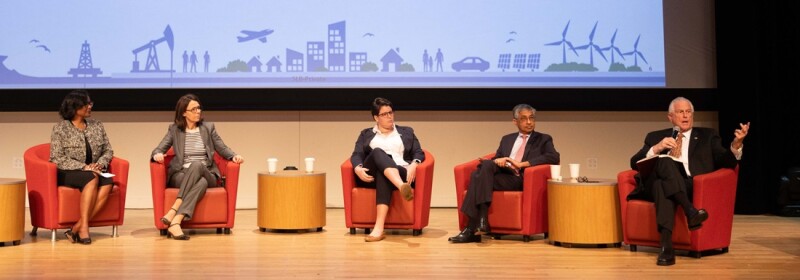The Society of Petroleum Engineers (SPE) Decarbonization Congress, held 3–4 February at the University of Houston, marked a pivotal moment in the oil and gas industry’s journey toward sustainability. This congress brought together global and regional leaders, sustainability experts, and industry stakeholders to address the pressing challenge of reducing greenhouse-gas emissions in the exploration and production (E&P) sector. With a focus on innovative solutions and collaborative efforts, the event aimed to accelerate the decarbonization of E&P operations and pave the way for a greener future.
The oil and gas industry is a significant contributor to global greenhouse-gas emissions, generating the equivalent of more than 5 gigatons of CO2 annually. Routine and nonroutine flaring, artificial lift, and processing facilities are among the top emitters in this sector. The SPE Decarbonization Congress emphasized the urgency of addressing these emissions to mitigate climate change and align with global sustainability goals.
The congress featured a series of sessions focused on critical themes, each designed to tackle specific aspects of decarbonization in the E&P sector.
The first session delved into the importance of accurately quantifying and reporting emissions. Participants discussed the latest modeling techniques and regulatory frameworks that drive decarbonization efforts. By establishing robust reporting mechanisms, the industry can better track progress and identify areas for improvement.
Flaring and venting are major sources of emissions in the oil and gas industry. A session was dedicated to exploring strategies to reduce flaring and venting through improved energy efficiency and electrification of operations. By adopting sustainable technologies, companies can significantly cut down on emissions and enhance operational efficiency.
Methane is a potent greenhouse gas, and its reduction is crucial for achieving decarbonization goals. The congress dedicated a session to addressing methane emissions, focusing on monitoring, modeling, and mitigating fugitive emissions. Innovative solutions such as gas-to-X technologies were discussed as potential game-changers in reducing methane leaks.
The transition to low-carbon energy sources is essential for the industry’s sustainability. Another session highlighted emerging solutions such as hydrogen, geothermal energy, carbon capture and sequestration, and advanced storage technologies. Collaboration among operators, service providers, universities, and government entities was emphasized as a key driver for the successful implementation of these solutions.
One of the congress’s primary objectives was to foster collaboration among industry stakeholders. By creating a platform for dialogue and knowledge exchange, the event aimed to accelerate the adoption of best practices and innovative approaches to decarbonization. Participants had the opportunity to share their experiences, challenges, and successes, creating a rich environment for learning and growth.
Technology and innovation play a crucial role in the decarbonization of the E&P sector. The congress showcased cutting-edge technologies that have the potential to transform the industry. From advanced monitoring systems to sustainable energy solutions, the event highlighted the importance of investing in research and development to drive progress.
The SPE Decarbonization Congress underscored the power of collaboration in achieving sustainability goals. By bringing together diverse stakeholders, the event facilitated meaningful dialogues and partnerships. Suppliers, service companies, and operators had the opportunity to connect and explore joint initiatives that could lead to significant environmental benefits.
The SPE Decarbonization Congress was not just an event; it was a call to action. The discussions and insights shared during the congress provided a roadmap for the industry to follow. By embracing sustainable practices, investing in technology, and fostering collaboration, the oil and gas sector can make significant strides toward a sustainable future.


The SPE Decarbonization Congress highlighted the critical need for the oil and gas industry to address its environmental impact. Through focused sessions, collaborative efforts, and innovative solutions, the congress provided a platform for industry leaders to come together and chart a path toward decarbonization. As the industry continues to evolve, the insights and strategies shared at the congress will play a pivotal role in shaping a greener and more sustainable future.
Co-chaired by Farshid Mostowfi of SLB and Trey Shaffer of ERM, this event was a first-of-its-kind collaboration between the SPE Sustainable Development Technical Section and the SPE Gulf Coast Section and attracted 185 participants, including 50 panelists and speakers. The congress collaborated extensively with the University of Houston and industry partners the International Association of Oil and Gas Producers, Ipieca, and Climate Investments.

